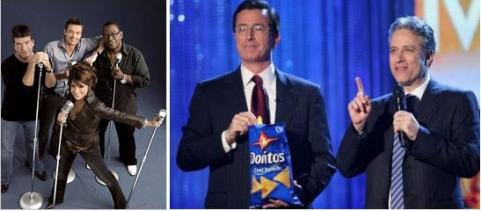TELEVISION UNPLUGGED? The Verdict On This Year's TV Upfronts - MediaBizBuzz for June 2

IT'S NOT TV, IT'S VIDEO
Think of it as the Big Bang of Video. We continue to expand from the first broadcast network in the 1920's to a galaxy of offerings, including online platforms like Veoh, Joost, Fancast, Hulu, and Blinx. In deference to Lehman Brothers and Merrill Lynch, both of which had forecast a bearish market for the TV Upfronts, scuttle over the weekend held that ABC was about to ink a pair of deals with Starcom and Zenith Media. Word is that it's getting 8-10% above last year's rates. Perhaps, despite the slowdown, a rising tide will lift all boats and we'll see the $9.1B market achieved in 2007. Not that it's a cakewalk. As we veer towards February, 2009 some 25 million folks are ill-equipped for the digital transition. And long before that -- at the tip of our nose -- is an impending SAG strike. Still, at this moment in time, it remains accurate to say that television remains the most valuable advertising medium.
The Verdict On This Year's TV Upfronts
Television is in an upheaval. The 100-day Writers Strike. Viewer erosion. The 2009 transition to digital. This year's Upfronts -- the broadcast TV industry's annual fete for advertisers and the press -- reflected equal parts Post-Apocalypse terror and New Frontier opportunity. While the bar was set low, the presentations offered wildly - with a few cable outlets crashing the party for the first time. JackMyers Media Business Report provided real-time coverage; this column attempts to get a handle on the evolving mediascape.
When network stalwarts like Lost and American Idol returned after the Writers Strike, their ratings took a drubbing. Compared to last year at that time, some six million viewers went AWOL. While many were lost to World of Warcraft or all-you-can-text mobile plans, doubtless more than a few made their way to cable, which saw a banner year in ratings (overall up 9%). Cable took full advantage this year of broadcast's decline in influence, kickstarting the Upfronts.
If the strike revealed one single flawed strategy of the networks, it was their over-reliance of the traditional September-May programming strategy. A year round permanent campaign, first pursued by ad-supported and premium cable, helped Fox dethrone CBS as the #1 network, and provided a deeper bench than its four rival broadcast networks. Post-strike the networks are all-about 52-week strategies, and in the case of NBC, 65-week! Each of the networks had an idiosyncratic take on what it meant to be current in the digital age; the continuum ranged from NBCU's Carnival-esque Experience to ABC's strictly-business affair.
Jack Myers has been a Hall of Famer when it comes to putting bets on the Upfronts. With the passage of time, his body of forecasts are all the more impressive. In this year's TV Upfront Economic Forecast, however, he declined to focus on the granular marketplace, instead sizing up the broader picture. His bottom line -- "The next generation of Upfront buying and selling relationships will incorporate network review of advertisers' creative strategies and an analysis of which advertising messages are most complementary to each network's program content, and which are most effective in holding audiences through commercial breaks" -- seems to be already upon us - in the context of several presentations this year.
Ed Martin covered the lion's share of Upfronts. If Jack Myers has offered apt guidance from the business side, Martin's nearly twenty years of industry experience permits him to likewise discuss the Upfronts from an historical perspective. As he opined just as Upfronts were to begin: "The question on everyone's mind is not, what shows will be on the networks' fall schedules, but, how will they present this information to advertisers and the press?"
THE BIG FIVE
NBCU opened the Upfront week with, as Martin termed it, the "Mother of All Upfronts." While it had little to show in the way of fall content, it had talent representing all of its platforms, including the NBC, Sci Fi, iVillage, Oxygen, Bravo, and Universal. While offering little in the way of breaking news, it was an effective showcase of NBCU's phalanx of properties. There was one announcement that perked up a few ears: WNBC-TV would be repositioned as a 24 hour newstation - a rival to NY1. Our Charlie Warner took umbrage that its owners weren't looking to serve the community better. As the week wore on and asceticism become the order of the day, the event was memorable for its Weimar-era excess.
CBS struck a middle ground for the Upfronts. While downscaling from previous years, (i.e., cancelling its Tavern on the Green party) its presentation at Carnegie Hall included actual clips of shows! The network also revealed a partnership with EQAL, the folks who gave the world Lonelygirl15 and Kate Modern. Soon after came news of its $1.8B acquisition of Cnet - not exactly YouTube, but definitely a play at building on its super-distribution strategy of "following the user," as well as buying a younger demo.
ABC offered - as promised -- a sober affair. While the Net looked forward with a new Advertising Value Index, dissembled by Jack Myers, announcing that it would bring In The Motherhood to television from MSN.com (where it has run up 21M views) and will shortly enable online viewers to embed shows like Desperate Housewives in their blogs, it took a backward stance in envisioning On Demand as an opportunity to disable fast-forwarding. That ship has sailed.
If CBS and ABC offered content, The CW -- in a wink to its target demo -- had style in spades. Its Upfront offered libation (and libido) to ABC attendees who were looking to loosen their neckties after Avery Fisher Hall. Nina Spezzaferro, our 18-24 expert, covered the event, including the announcement that The CW would essentially be outsourcing its Sunday night programming to Media Rights Capital.
Fox was able to leverage its two Buzzy fall shows -- offerings from name brands Joss Whedon and J.J. Abrams -- for maximum effect. While ABC has suggested that it will increase commercial minutes on its webcasts, Fox touted its Remote-Free Initiative that would limit commercial breaks to five minutes per hour. While not as Bling as NBC, the City Center event unified style and substance and for many, was a return to the Upfronts of old.
CABLE: FLIPPING THE SCRIPT
Cable's presence at the Upfronts -- for many first-time outings -- was striking in just how well they balanced programming, integrated advertising, and innovative initiatives. Turner had the Chutzpah to slot itself in, not preceding, Upfront week proper. Its presentation argued that while broadcast had been the gold standard for scripted television and cable was where you went for "men in tights" and talking cars named Kitt, that times have changed. It's on broadcast network that you'll find American Gladiators and a Knight Rider remake, while cable - and Turner in particular - has attracted the likes of Holly Hunter and Kyra Sedgwick to series television. Not only did it dangle catnip to the ad industry in the form of a new series, Truth In Advertising, but it described a new program -- TV in Context - that would marry ad spots with relevant scenes.
If Turner was on its game, MTVN was On Fire. Not only did it offer an A-List roster of talent, but it integrated them into its branded entertainment presentation. Just prior to the Upfronts Nina Spezzaferro spoke with the network on working with Unilever and PepsiCo on such offerings as the microseries, Fresh Takes. Onstage, Stephen Colbert, in character, was the perfect choice for this missive: "Doritos and I broke down the outmoded barriers between the advertiser and the content that has, for too long, filled the useless holes between it." Most strikingly, MTV accepted responsibility not just for its content, but for the "entire length of play." That level of commitment has served it well, Viacom's ad revenues were up 8% last year. MTVN's Spike has been likewise groundbreaking - in some cases acting as an agency and producing creative for the client like Random Acts of Cheetos. (Aside: B.E.T.'s lackluster Upfront was all the more disappointing given MTV's stellar event.)
Univision had to be included among everyone's Upfront favorites. It offered a mix of entertainment and a compelling proposition -- that the Hispanic-market was untapped and represented value for advertisers. Bravo's Upfront not only epitomized the dynamic audience growth of cable, but it was a leading example of a network exploring cutting-edge cross-platform extensions. If Lifetime had any substantive news, it was largely overshadowed by its poaching of Project Runway from Bravo. Perhaps it was the Zeitgeist, but there was a flurry of announcements coinciding with the Upfronts: HBO's addition to iTunes, which saw Apple -- at last -- add flexibility to its pricing structure. PBS' partnership with The Platform, which will enable it to syndicate and share video with hundreds of local affiliates.


